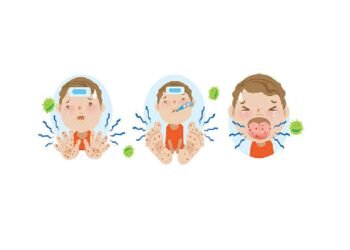Rehumanize Vaccination is an important tool in promoting a healthier population not only by saving millions of lives every year from preventable diseases.
The Indian health system has made some steps forward in the field of immunization however, the problem still exists, particularly, for groups such as elderly and babies.
The use of home vaccination services can assist this, thus not only improving the vaccine uptake in India but also creating a convenient and fast solution for the customers. This paper analyzes how health care in India has advanced, in particular, how home vaccination services are increasing the accessibility of vaccinations for the young and elderly.
Why are vaccinations important for older people?
1. Protecting Against Vaccine-Preventable Diseases
Vaccination in adults is critical for the prevention of severe diseases such as influenza, pneumonia, and shingles. These illnesses can have a more serious impact on elderly people, leading to hospitalisation or dying.
The vaccines support the immune system of the elderly thus making them less likely to catch the disease and its consequences.
2. Enhancing Quality of Life
Vaccination makes senior citizens not only healthy but also gives them a chance to live their lives to the fullest. Immunization reduces healthcare costs and enhances quality of life by eliminating the diseases and lessening the disease burden.
3. Addressing Age-Related Vulnerabilities
With the passage of time, it is a fact that an immune system’s efficiency decreases in a natural way, therefore, rendering one vulnerable to the attack of infections. Vaccines add an IV level of protection that compensates for the husband’s natural decline and supports the health of aged persons.
4. Reducing Healthcare Burden
Adult vaccination programs can facilitate the healthcare system’s easing of burdens since the vaccinated are not likely to bring about disease outbreaks that can be easily preventable with vaccines. This is significantly relevant in India, where the availability of healthcare resources is often restricted.
5. Promoting Community Immunity
Immunizing a bigger section of society means the immunoefficient who cannot be vaccinated will also benefit, for example, people who have some specific medical conditions. This concept, known as herd immunity, is vital for the public health safeguard.
What are the challenges of adult vaccines?
1. Awareness and Education
Countless seniors are unaware of the importance of adult vaccination and the accessibility of vaccines. Public health campaigns are needed to inform this particular group about the pros and cons of vaccinations.
2. Accessibility
Senior citizens may experience problems with going to the vaccination centers because of mobility issues, long distance to the healthcare facilities, and transportation restrictions. On-the-road vaccination services are aimed at getting around these obstacles by bringing vaccines directly to patients’ doorsteps.
3. Vaccine Hesitancy
The fact that seniors are not willing to get vaccinated due to misinformation and unfounded beliefs about the vaccine is also a reason for this. It is important firstly to tackle these worries by informing in a straightforward and evidence-backed manner in order to boost the vaccination rates.
4. Healthcare Infrastructure
In some areas, especially in the countryside, healthcare infrastructure needs to be improved in order to make adult vaccination possible. Health systems and mobile clinics can aid in addressing these obstacles.
5. Financial Constraints
The cost of vaccines can be a problem for many old people, the ones who have not enough money are mostly the ones affected by this problem. Government-funded vaccination programs and insurance options can enhance the affordability and availability of vaccines.
What are the recommendations for vaccination in older adults in India?
1. Convenience and Comfort
Vaccination services at home offer the advantage that the patient can be vaccinated without leaving the house. The nature of such situations is enhanced for the elderly who might have problems moving around quickly or have some chronic illnesses.
2. Personalized Care
Healthcare providers who give vaccinations at home can come up with a plan tailored to the individual, answer the questions, and deal with the concerns in a one-on-one way. Scientific research indicates better vaccine uptake and increased trust among patients.
3. Improved Compliance
Home vaccination services are leading to better adherence to vaccination schedules by making it unnecessary to visit a healthcare facility. Elders are more likely to get all recommended vaccines on time.
4. Safety and Hygiene
Vaccination services at home entail administering vaccines in a pleasant and sterile environment, reducing the risk of exposure to other infections in congested medical facilities.
5. Comprehensive Health Assessments
House calls allow doctors to carry out in-depth health checks, thus spotting any additional problems and giving appropriate advice.
What is the importance of vaccines in child survival?
1. Early Protection
Vaccination is the way of protecting babies’ lives from extreme sickness in the most vulnerable time of their life. Timely vaccination is the key to preventing diseases like measles, mumps, and rubella, which can severely affect the health of children.
2. Long-Term Health Benefits
Child vaccination is a way of maintaining the health of children by preventing diseases that may result in long-lasting effects. Immunized children are more likely to stay healthy and succeed in life as they get older.
3. Promoting Public Health
Vaccinating kids is a vital way to help the fight against outbreaks of diseases that can be prevented by vaccines, thereby, ensuring the protection of the whole community. Public health and crisis prevention are looked after by high vaccination rates.
4. School Readiness
Vaccine kids are less likely to miss school due to sick days, thus, enabling better school performance. Healthy kids have better opportunities for success at school and in social relationships.
What are the challenges of child immunisation programs?
1. Access to Healthcare
Families living in distant or isolated areas may find it hard to get treatment in healthcare centers. The home vaccination services provide a convenient way of administering vaccines directly to the child at home.
2. Parental Awareness
Parents have to understand the importance of child vaccination and the recommended vaccination schedule. Environmental health fairs and educational interventions are essential.
3. Vaccine Hesitancy
Parents’ fears regarding vaccination can be boosted by confronted by misinformation and myths surrounding vaccines. Powerful and factual driven communication is the main instrument for this purpose and vaccination promotion.
4. Financial Barriers
Inevitably, the cost of vaccines will act as a barrier to a large portion of the households. Implementing schemes with lower rates for vaccination, as well as providing insurance coverage for vaccines, will ultimately lead to the reduction of their expenses and the wider distribution of them.
5. Cultural Beliefs
Among others, it can encompass cultural beliefs and customs that may influence vaccination decisions. Culturally considerate public health campaigns need to be implemented to get past these problems and to motivate the population to immunize.
What is the importance of vaccination to babies?
1. Convenience for Parents
Home vaccination services are enabling parents to vaccinate their children without the necessity of going to the clinic. This is particularly advantageous for parents with several children or people living in remote areas.
2. Comfort for Infants
Getting vaccinated in a setting that is familiar can help infants feel less stressed, ultimately decreasing feelings of anxiety and discomfort. Home vaccination services offer a serene and reassuring environment for children.
3. Improved Vaccination Rates
Home vaccination services increase vaccination rates among infants by removing access barriers. Increased numbers of children are receiving all recommended vaccines on schedule, which is improving public health.
4. Personalized Care
Healthcare providers delivering vaccinations at home can provide individualised attention, responding to parents’ inquiries and addressing their worries. This tailored method aids in fostering trust and faith in vaccines.
5. Comprehensive Health Assessments
In home visits, healthcare providers can conduct thorough health evaluations, pinpointing any extra health requirements and giving suitable recommendations.
The evolution of home vaccination services in India
1. Technological Advancements
Technological advancements have played a significant role in the evolution of home vaccination services. Mobile apps and online platforms allow for easy scheduling and tracking of vaccination appointments, improving accessibility and compliance.
2. Government Initiatives
Government initiatives have been instrumental in promoting home vaccination services in India. Programs like Mission Indradhanush aim to increase vaccination coverage and ensure that every child receives life-saving vaccines.
3. Partnerships with Private Providers
Partnerships with private healthcare providers have expanded the reach of home vaccination services. These collaborations help bridge gaps in the healthcare system, ensuring more people have access to vaccines.
4. Community Engagement
Community engagement is crucial for the success of home vaccination services. Public health campaigns and community outreach initiatives help raise awareness and encourage participation in vaccination programs.
5. Training and Capacity Building
Training and capacity building for healthcare professionals are essential for the effective delivery of home vaccination services. Ongoing training ensures that healthcare workers are equipped with the knowledge and skills needed to provide high-quality care.
What are the benefits of home immunisation services?
1. Increased Access to Vaccines
Home vaccination services improve vaccine accessibility, especially for at-risk groups such as the elderly and young children. These services remove obstacles to access by delivering vaccines to the patient’s residence.
2. Improved Vaccination Rates
Home vaccination services increase vaccination rates by making the process more convenient and accessible. Increased numbers of individuals are adhering to the recommended vaccine schedule, leading to improved public health.
3. Enhanced Patient Experience
Vaccination services at home offer a patient experience that is more customized and convenient. Receiving vaccines in a familiar setting helps to decrease anxiety and discomfort, especially among children and seniors.
4. Reduced Healthcare Burden
Home vaccination services help alleviate the strain on healthcare systems by preventing diseases that could have been prevented by vaccines. There is a reduced need for hospitalisation or treatment for vaccine-preventable diseases, allowing resources to be allocated to other healthcare needs.
5. Better Health Outcomes
Higher rates of immunization result in improved health results for individuals as well as for communities. Those who have been vaccinated have a lower risk of getting and spreading illnesses that can be prevented by vaccines, which benefits the health of the community as a whole.
Home vaccination services in India have transformed healthcare by making life-saving vaccines more accessible to seniors and infants. Home vaccination services will continue to be crucial in ensuring equal access to vaccine protection as healthcare progresses.























